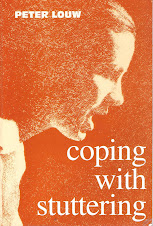Some years ago in our self-help group for people who stutter in Johannesburg I met a man who mentioned that he only stuttered on two or three words and was otherwise completely fluent. It didn’t really bother him, he said, as he word-substituted if really necessary. He didn’t regard himself as a ‘real’ stutterer, spoke fluently as far as I could tell and only attended one meeting, apparently to find out what caused his minor dysfluency.
I would call this person a ‘borderline stutterer’, and it would seem that not much is known of this category, if it in fact exists. I have never read anything about similar cases; and this lack of information could be because this type of stutterer rarely if ever visits a speech therapist, simply because they don’t need therapy.
Even so I think that it is a very important category because it may shed more light on the disorder. If a person just stutters on one word, would it not strengthen the hypothesis that stuttering is in large part conditioned struggle behaviour reinforced over the years?
I hypothesise that borderline stutterers exist and that they can offer important information about stuttering. If stuttering is regarded as a spectrum ranging in severity from near muteness to very minor, it makes sense that you will also get stutterers who have very few symptoms, sometimes so minor that they can hardly be described as stutterers.
Therefore I am looking for borderline cases. If you are a person who only stutters on one or two words or sounds, please participate in the informal survey below. Or if you are a speech student/therapist/researcher, why not do some research yourself? You could get great marks / impress colleagues / become famous ... :-)







Hi there! I really like your post about borderline stuttering. I'd say I'm a little more toward the stuttering side than borderline, but my dysfluency has gone down incredibly since I was younger. That said, I sometimes get varying strengths of blocks. A lot of people tell me that they don't know that I stutter until I tell them that I do. Others catch me at my worst moments where I'm unable to get something across completely. I'm really struggling in my self-identification of my stutter as I definitely do have experiences (often depending on sleep, eating, drinking, stress, etc.) where it's almost impossible to speak. Other times, I sound like I don't even have much of a dysfluency since I'm very high functioning. It's very frustrating and like you, I'd love to know more about this and also thoughts from the stuttering community about being in both fluent and disfluent worlds. Thanks!!
ReplyDeleteDear Stephanie, many thanks for your reply! Much appreciated. Yes, many of us live in two worlds - the world of fluent speakers and the world of people who stutter. That can be very difficult as it becomes very hard to adjust to the disorder when it is so erratic and intermittent. If you would like to know more thoughts about this and other stuttering issues as experienced by the stuttering community, I can recommend the "Stuttering Community" forum discussion website at www.stutteringcommunity.com You will also find me there under the username of Nemo. Looking forward to see you there! Kind regards, Peter
ReplyDeleteI considered myself to be a closet stutter but I only have probably 1 or 2 words max that fumble me up which would possibly make me a borderline stutterer. If you need more insight, I may be able to provide more detail.
ReplyDeleteDear Anonymous, many thanks for your comment! You strengthen my hypothesis that stuttering is not the result of a physiological brain abnormality, but rather a learned, conditioned problem, probably as a result of a stress-sensitive vocal fold malfunction. The survey on the left side of my blog, and on the Stuttering Community site, has also indicated quite a lot of people who seem to be borderline cases. The borderline people usually seem to be covert stutterers, and they seldom go to a therapist, that's one reason why the therapist community is unaware of them. Many thanks again and kind regards.
ReplyDeleteno problem. you are doing really good things and are helping a lot of people so keep up the good work.
ReplyDeleteI was a mild stutterer when I attended speech therapy sessions which mainly consisted of fluency shaping techniques.After attending,I developed avoidance to only 'A'.Apart from this word at beginning, I didn't stutter.Now,after practicing with that word daily for 3 months in dictionary,I've finally eliminated all my 'block words'
ReplyDeleteDear Bornto Win, many thanks for your response. Your comment is still more proof that the "borderline stutterer" does exist (or has existed in your case, as you no longer have blocks). Congratulations on eliminating your problem words and on your hard work. Your example, in my opinion, further demonstrates that stuttering is a learned problem and that mild cases can indeed unlearn it. All the best and kind regards.
ReplyDelete